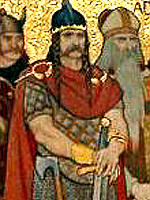James Baker is an American attorney and statesman.
Thomas Jones may refer to:
David, Dafydd, Dai, Dave, Davy, or Di Jones may refer to:
Vaughan and Vaughn are surnames, originally Welsh, though also used as a form of the Irish surname McMahon. Vaughan derives from the Welsh word bychan, meaning "small", and so corresponds to the English name Little and the Breton cognate Bihan. The word mutates to Fychan an identifier for a younger sibling or next of kin. It can also be used as a first name Vaughan.

Kenneth is an English given name and surname. The name is an Anglicised form of two entirely different Gaelic personal names: Cainnech and Cináed. The modern Gaelic form of Cainnech is Coinneach; the name was derived from a byname meaning "handsome", "comely". A short form of Kenneth is Ken.
Henry Jones may refer to:
John Hughes may refer to:
Mark Williams may refer to:
Richard Jones may refer to:
David Lloyd may refer to:
Richard Williams may refer to:
Melville is a surname and a given name.

Campbell is a Scottish surname —derived from the Gaelic roots cam ("crooked") and beul ("mouth")—that had originated as a nickname meaning "crooked mouth" or "wry mouthed." Clan Campbell, historically one of the largest and most powerful of the Highland clans, traces its origins to the ancient Britons of Strathclyde. Between 1200 and 1500 the Campbells emerged as one of the most powerful families in Scotland, dominant in Argyll and capable of wielding a wider influence and authority from Edinburgh to the Hebrides and western Highlands.
Broderick is a surname of early medieval English origin and subsequently the Anglicised versions of names of Irish and Welsh origin. It is also a given name.
Events from the year 1932 in the United Kingdom.
Colin is an English-language masculine given name. It has two distinct origins:
- A diminutive form of "Colle", itself an Old French short form of the name Nicolas (Nicholas). This name, but not the anglicized Gaelic name, is also found in the spelling Collin. This name is formed by the Old French diminutive -in also found in Robin.
- An anglicized form of the Gaelic name Cuilen, Cailean, modern Irish spelling Coileáin, meaning "whelp, cub". The Old Irish word for "whelp", is cuilén. The Scottish Gaelic name is recorded in the spelling Colin from as early as the 14th century. MacCailean was a patronymic used by Clan Campbell, after Cailean Mór.

Baker is a common surname of Old English (Anglo-Saxon) origin and Scotland where Gaelic was anglicized. From England the surname has spread to neighbouring countries such as Wales, Scotland and Ireland, and also to the English speaking areas of the Americas and Oceania where it is also common. The gaelic form of Baker in Scotland and Ireland is Mac a' Bhacstair. Some people with the surname have used DNA to trace their origins to Celtic countries and specifically to the Baxter sept of the Clan MacMillan in Scotland. It is an occupational name, which originated before the 8th century CE, from the name of the trade, baker. From the Middle English bakere and Old English bæcere, a derivation of bacan, meaning "to dry by heat". The bearer of this name may not only have been a baker of bread. The name was also used for others involved with baking in some way, including the owner of a communal oven in humbler communities. The female form of the name is Baxter, which is seen more in Scotland. The German form of the name is Bäcker.
Owen is usually an anglicised variant of the Welsh personal name Owain. Originally a patronymic, Owen became a fixed surname in Wales beginning with the reign of Henry VIII. Etymologists consider it to originate from Eugene, meaning 'noble-born'. According to T. J. Morgan and Prys Morgan in Welsh Surnames: "the name is a derivation of the Latin Eugenis > OW Ou[u]ein, Eug[u]ein ... variously written in MW as Ewein, Owein, Ywein. LL gives the names Euguen, Iguein, Yuein, Ouein. The corresponding form in Irish is Eoghan." Morgan and Morgan note that there are less likely alternative explanations, and agree with Rachel Bromwich that Welsh Owein "is normally latinised as Eugenius", and that both the Welsh and Irish forms are Latin derivatives.
This page is based on this
Wikipedia article Text is available under the
CC BY-SA 4.0 license; additional terms may apply.
Images, videos and audio are available under their respective licenses.


